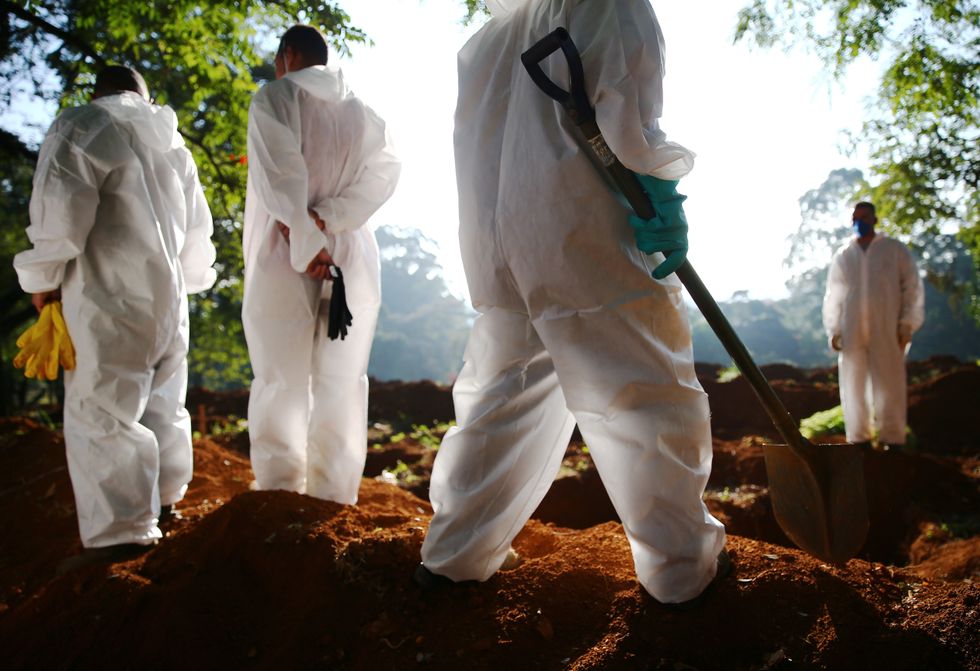WHO sounds global health alarm over looming infectious disease threat poised to kill over 40 million people

Antimicrobial resistance poses a grave threat to life and healthcare systems around the world, researchers warn
|Getty Images/Grok

Researchers warn that the "time to act is now".
- AMR could kill 1.91 million people between now and 2050
- Researchers calling for urgent measures to contain the threat
Don't Miss
Most Read
The World Health Organisation (WHO) has called antimicrobial resistance (AMR) “one of the top global public health and development threats” after a global analysis estimated more than 39 million people could die from AMR infections between now and 2050.
Researchers from the Global Research on Antimicrobial Resistance (Gram) project warn that "now is the time to act" after their study, published in The Lancet, found that over one million people died annually from drug-resistant infections between 1990 and 2021.
While deaths among children under five fell by 50 per cent during this period, they increased by more than 80 per cent in those aged 70 and older.
The findings highlight the urgent need for measures to combat antimicrobial resistance (AMR), including improved infection prevention, vaccination programmes, and reduced inappropriate antibiotic use.

The findings highlight the urgent need for measures to combat antimicrobial resistance (AMR)
|Getty Images
Researchers estimate that by 2050, 1.91 million people could die directly from AMR each year - a 70 per cent increase compared to 2022.
Additionally, AMR bacteria are projected to play a role in 8.22 million annual deaths by mid-century, up 75 per cent from 2021.
Doctor Mohsen Naghavi, lead author from the University of Washington, said: "These findings highlight that AMR has been a significant global health threat for decades and that this threat is growing."
The study analysed data on 22 pathogens, 84 pathogen-drug combinations, and 11 infectious conditions (including meningitis, bloodstream infections and other infections) across 204 countries and territories.
Researchers used various sources, including hospital records, death certificates, and antibiotic usage data.
Doctor Kevin Ikuta from the University of California Los Angeles and affiliate professor at Health Metrics (IHME), University of Washington, emphasised the need for immediate action to protect people globally from AMR.
He said the fall in deaths from sepsis and AMR among young children over the past three decades is an incredible achievement, but the threat to older people will only increase as populations age.
He added: “Now is the time to act to protect people around the world from the threat posed by AMR.”
The study projects that AMR-related deaths will increase steadily in coming decades, with South Asia facing the highest toll.
Countries like India, Pakistan, and Bangladesh could see a total of 11.8 million deaths directly due to AMR between 2025 and 2050.
Doctor Stein Emil Vollset, study author from the Norwegian Institute of Public Health, stressed the urgency of developing new strategies to combat AMR.
These include creating new vaccines and drugs, improving healthcare access, and providing guidance on effective antibiotic use.
LATEST HEALTH DEVELOPMENTS

Countries like India, Pakistan, and Bangladesh could see a total of 11.8 million deaths directly due to AMR
|Getty Images
Doctor Colin Brown, deputy director at the UK Health Security Agency, called the report "another reminder that antibiotic resistance is a threat to all of us - not just in the future but now".
He urged the public only to take antibiotics when prescribed by healthcare professionals and to complete the full course as directed.
In a related comment piece in The Lancet, experts warned of a potentially disastrous increase in resistance to antifungal drugs.
Scientists from the University of Manchester, Westerdijk Institute, and the University of Amsterdam highlighted that most fungal pathogens identified by the WHO are already resistant or rapidly acquiring resistance to available treatments.
These fungal diseases account for approximately 3.8 million deaths annually.
Doctor Norman van Rhijn from the University of Manchester emphasised that the threat of fungal pathogens and antifungal resistance is often overlooked in AMR discussions.
Hope on the horizon?
Researchers at the University of Cambridge have made progress in developing monoclonal antibody treatments to combat AMR.
They have developed a monoclonal antibody drug, using a technique involving genetically engineered mice
Their study, published in Nature Communications, demonstrated the potential of these engineered antibodies to prevent infection with Acinetobacter baumannii, a bacteria commonly associated with hospital-acquired infections.
This research offers a promising avenue for new treatments to address the growing AMR crisis.










